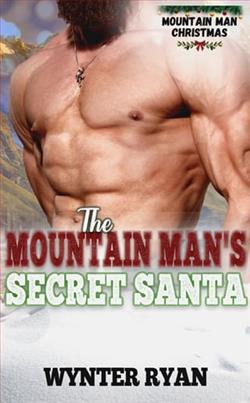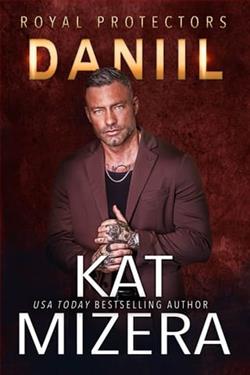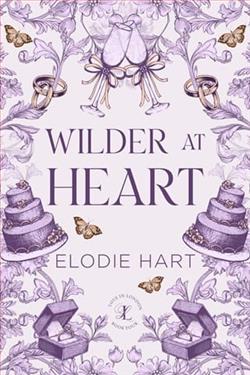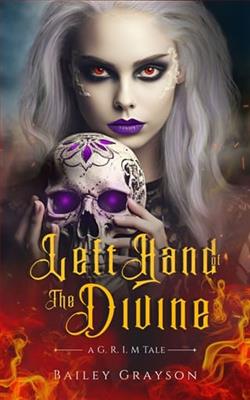Page 52 of Immortal By Morning
“Make their host young?” she suggested.
He nodded slowly, something about her tone making his eyes turn wary. “Basically, yes.”
Abril considered what he’d said, and then asked, “So if an elderly person—someone in their eighties, for instance—if they had cancer and were given the nanos to try to cure them, the nanos would not just cure the cancer, but make the older person young too?”
“Well, yes and no. They would still be eighty yearsold, but their body would be healthy and at its peak condition.”
“Which is twenty-five to thirty,” she pointed out. “Much younger than eighty.”
Crispin nodded.
Abril sat back slightly, her expression showing her awe. “Your family has discovered the fountain of youth.”
He relaxed a little. “Some people have called it that.”
Abril sat up abruptly. “Why is this not known everywhere? This should be on the news. It’s a miracle cure. We should be calling CNN right now.”
“Unfortunately, it would not be considered good news,” he assured her.
“What? That’s crazy! Why isn’t it good news?” Abril asked, finding it hard to believe it wouldn’t be welcomed as the great miracle cure it was. Then her eyes widened, and she breathed, “Oh. Right. I get it. We already have a population problem and are doing untold damage to the earth because of it. Clear-cutting forests, causing pollution, causing the extinction of different species...” She sighed. “If everybody knew about this and demanded access, that would be the end of death. There wouldn’t be a square foot left on the planet where a person wasn’t standing.”
“Yes, that is an issue,” he agreed. “But there is another problem.”
“What’s that?” she asked with surprise. She would have thought the one she’d just mentioned was really the only one.
Crispin hesitated, and then said, “I did mention that the nanos are bioengineered. They use blood to both propel themselves, as well as to make more of theirkind in the body. They often even use blood to perform their repairs and healing.” He paused briefly and then admitted, “But often, they use more blood than the human body can produce.”
Abril considered that briefly, and then said, “So, what do they do?” she asked, and before he could answer did it herself saying, “I guess they get blood transfusions to make up for that or something.”
“That is exactly what they did,” he said, sounding relieved.
Abril was more than a little relieved herself. The image of the skeleton in the garden with its fangs had flashed briefly through her mind as she’d considered what he’d said. She’d actually thought for a moment that maybe the fangs had been the answer to the issue of needing blood, and what they were talking about was that the patients had essentially turned into vampires to get the blood they needed. She was more than relieved to learn that wasn’t the case and the patients with these nanos were given transfusions to deal with the necessity for blood.
Smiling crookedly, she told him, “Honestly it doesn’t sound like a bad trade-off. I mean, I hate needles. But putting up with a transfusion every once in a while, in exchange for looking young and being healthy for the rest of your days doesn’t seem like a bad deal.” She paused briefly as she considered what she’d just said, and then asked, “So, by immortal you just mean long-lived, right? You guys don’t live forever. No one lives forever.”
Crispin hesitated and then told her, “Barring being set on fire, or having their head cut off and kept awayfrom the body long enough that it cannot reattach, immortals can live indefinitely.”
Abril’s mind was in sudden chaos. “Indefinitely?”
Crispin nodded, his expression solemn.
“How long is indefinitely?”
He was silent for a moment, and then said reluctantly, “Lucian was born in Atlantis several millennia ago.”
Abril stiffened, her gaze fixed on him as she said with disbelief, “Atlantis?”
“That is where the nanos were developed,” he explained.
“Atlantis,” she repeated, her brain having trouble accepting what he was telling her. A short, disbelieving laugh slipped from her lips, and she said, “You want me to believe that scientists thousands of years ago in the mythical land of Atlantis, developed bioengineered nanos that are the fountain of youth and that Lucian, your uncle Lucian, who is presently sitting out there in Gina’s kitchen, was born way back then and way over there—wherever there is?”
“Was,” he corrected, and when her gaze went blank with confusion, explained, “My uncle was born way back then, and way over there where Atlantiswas. Atlantis fell. It no longer exists.”
She stared at him silently, amazed that he was continuing with this line. It was so ridiculous. “From my understanding, Crispin, toilet paper was invented in New York in the 1850s. Before that, they were using leaves, sticks, moss, shells, corn husks, and water to clean themselves after taking a shit. But you want me to believe that thousands of years before that, your ancestors came up with bioengineered nanos that—”
“Atlantis was more developed than the rest of the planet at that time,” he interrupted her to say. “They were far in advance of the rest of the world. But they kept those advancements to themselves.”
“How?” she asked at once and didn’t hide her disbelief. In her experience, it was almost impossible to keep secrets in this world. How could the Atlanteans have kept such advancements from their neighbors on the planet?















